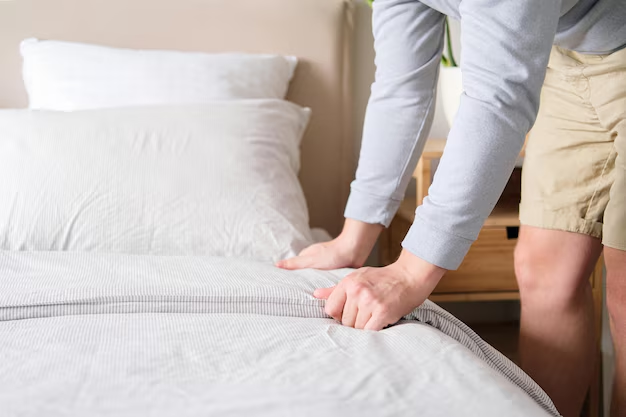Your Guide to Does Medicare Pay For Mattresses
What You Get:
Free Guide
Free, helpful information about Medicare Insurance and related Does Medicare Pay For Mattresses topics.
Helpful Information
Get clear and easy-to-understand details about Does Medicare Pay For Mattresses topics and resources.
Personalized Offers
Answer a few optional questions to receive offers or information related to Medicare Insurance. The survey is optional and not required to access your free guide.
Is Your Mattress Covered by Medicare? What You Need to Know
A good night's sleep is essential for maintaining health and well-being, yet one factor that can heavily influence sleep quality is often overlooked: the mattress. If you're a Medicare beneficiary and find yourself needing a new mattress for medical reasons, you might be wondering if Medicare will help cover the cost. Here's what you need to know to navigate this question effectively.
When Does Medicare Cover Mattresses?
Medicare Part B categorizes certain types of mattresses as Durable Medical Equipment (DME). For Medicare to cover a mattress, specific criteria must be met, primarily revolving around medical necessity as determined by a healthcare provider. Here's how you can ensure eligibility:
Medical Prescription: Your doctor must provide a prescription indicating that the mattress is medically necessary. This usually means you need a specialized mattress due to a medical condition, such as pressure ulcers or severe back pain.
Approved Suppliers: The mattress must be purchased from a supplier approved by Medicare. Opt for suppliers participating in Medicare, and confirm their status before finalizing your purchase.
Types of Mattresses Covered: Not all mattresses are eligible. Medicare often covers semi-electric beds, gel overlay mattresses, and certain pressure-reducing mattresses.
It's crucial to remember that Medicare typically does not cover regular mattresses, even those marketed as "orthopedic" unless they are part of a hospital bed setup that's medically necessary.
Navigating Other Resources for Financial Assistance
While Medicare can provide coverage under specific conditions, many individuals will find themselves looking for additional help or alternatives, especially if a mattress doesn’t meet the criteria. Here's where you can turn:
Medicaid and State Programs: Depending on your state, Medicaid may offer additional benefits. Contact your state's Medicaid office for detailed information about potential coverage for specialized mattresses.
Veterans Affairs (VA): If you're a veteran, the VA often provides additional support for medical equipment, including specialized mattresses.
Non-Profit Organizations: Some non-profits focus on providing mattresses and bedding to those in need, particularly for low-income families and individuals with health challenges.
Expanding Your Options with Financial Aid and Educational Resources
Evaluating how to fund health-related expenses requires a strategic approach. Consider exploring these avenues:
Credit Card Solutions: Using a zero-interest credit card for initial purchases can defer costs, although it's crucial to plan how to pay it off before interest kicks in.
Debt Relief Programs: If you're dealing with high medical expenses and struggling to manage them, debt relief options can provide a structured way to reduce your financial burden.
Educational Grants and Assistance: For those considering career advancement or seeking more stable employment to ease financial strain, educational grants offer an opportunity to upskill. Many grants and scholarships do not require repayment.
Understanding these facets not only ensures you get the right assistance but also empowers you to make decisions that support your health and financial situation long-term.
✨ Financial and Educational Resources at a Glance
- Medicaid Assistance: Check specific state programs for supplemental DME coverage.
- Veterans Affairs Benefits: Explore additional DME benefits for veterans.
- Non-Profit Support: Seek out non-profit organizations for aid with medical necessities.
- Zero-Interest Credit Cards: Consider as a short-term solution for larger purchases.
- Debt Relief Options: Investigate structured programs to manage escalating costs.
- Educational Grants: Look into grants for skill development to improve financial security.
What You Get:
Free Medicare Insurance Guide
Free, helpful information about Does Medicare Pay For Mattresses and related resources.

Helpful Information
Get clear, easy-to-understand details about Does Medicare Pay For Mattresses topics.

Optional Personalized Offers
Answer a few optional questions to see offers or information related to Medicare Insurance. Participation is not required to get your free guide.


Discover More
- Am I Elgible For Medicare
- Am I Enrolled In Medicare
- Am I Qualified For Medicare
- Are Adult Diapers Covered By Medicare
- Are Chemotherapy Drugs Covered By Medicare Part d
- Are Colonoscopies Covered By Medicare
- Are Covid Tests Covered By Medicare
- Are Cpap Machines Covered By Medicare
- Are Cpap Supplies Covered By Medicare
- Are Dental Implants Covered By Medicare
